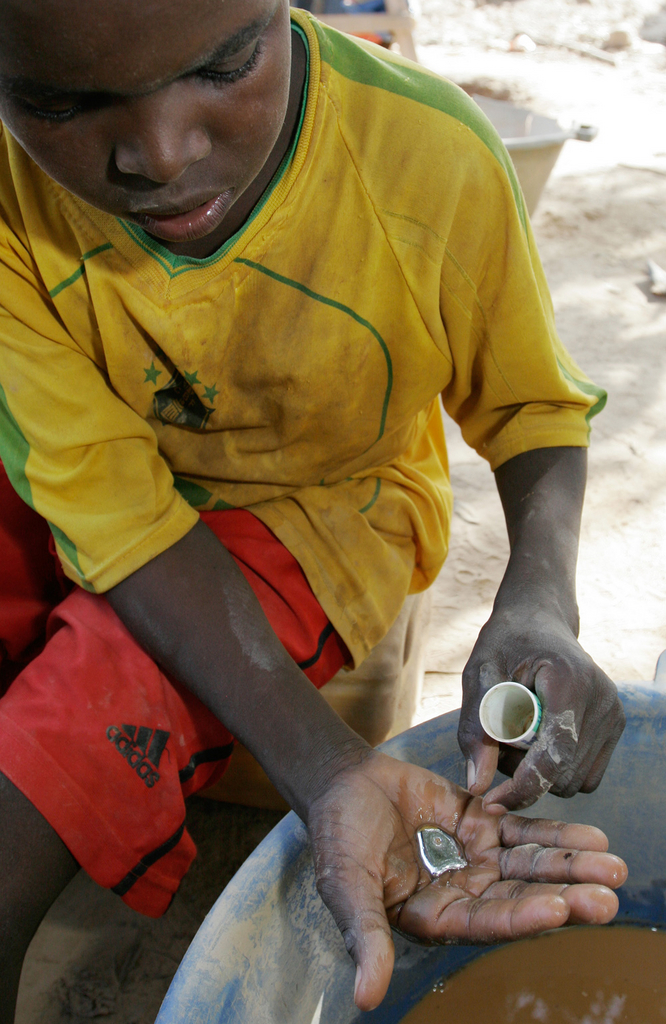Global mercury convention adopted

About 140 countries adopted in Geneva on Saturday a new convention aimed at cutting mercury emissions, a toxic metal used in computers and gold mining. The agreement was reached in the fifth round of negotiations taking four years in total.
The convention addresses the mining, processing and storing of the heavy metal, which is highly toxic to living organisms. Mercury is dispersed worldwide after being released into the air or washed into rivers and oceans. Humans are poisoned by inhaling the vapours or eating contaminated fish.
“After complex and often all-night sessions here in Geneva, nations have today laid the foundations for a global response to a pollutant whose notoriety has been recognized for well over a century,” Achim Steiner, UN Under-Secretary General and Executive Director of the UN Environment Programme, said at the close of the meeting.
Franz Perrez, head of the Swiss delegation involved in the talks, said Switzerland “is very pleased with this new development in the global management of the substances that are most toxic to health and the environment.”
The convention was concluded thanks to Switzerland’s persistent efforts, Perrez told swissinfo.ch, adding that he expects it to come into force in three to five years, once the individual countries have ratified the treaty. A signing ceremony will be held later this year.
When mercury accumulates in the bodies of living organisms, it can cause disorders of the nervous, immune and reproductive systems. In a worst case, severe mercury poisoning can lead to insanity, paralysis, coma and death within weeks.
One or two grams of mercury is released in its metallic form and as vapour for every gram of gold produced using the amalgamation process, according to a study by UN Industrial Development Organization UNIDO. It estimates that small-scale gold mining is responsible for about a third of mercury emissions.
Banned by 2020
Every year, 2,000 tonnes of mercury arising from human activities such as coal-fired power plants and gold mining are emitted into the atmosphere, according to the Swiss environment office. The heavy metal is found at the site of contamination but because of its extreme volatility also at locations far from its original source.
The 147 countries involved in the talks agreed to ban mercury in thermometers, batteries and energy-saving light bulbs by 2020. For the moment, the treaty excludes vaccines using mercury as preservative. Dental fillings using mercury amalgam will be phased down, according to the UN Environment Programme.
Countries will have to install filters and scrubbers on coal-fired power stations and make sure no mercury is released during copper and gold mining. Gold mining, where mercury is used in to extract gold from ore, will be largely affected. The opening of new mercury mines will be prohibited, and existing ones would have to be closed over time, Perrez said.
The ban will particularly affect artisanal gold mining, which – triggered by booming gold prices – has become a lucrative source of income in countries such as Thailand, Peru and Senegal over recent years. At the same time it poses a large risks to the miners, their families and surrounding communities, who often are not aware of the health effects.
Perrez added that nations with small-scale mining will have to reduce and eliminate the use of mercury, raise public awareness and support mercury-free alternatives. Developing countries will get support from the Global Environment Facility and additional programmes.
Initial funding to fast track action until the new treaty comes into force has been pledged by Japan, Norway and Switzerland. The latter will support the early work of the new convention through an financial contribution of SFr1 million ($1.1 million).
Switzerland – which hosts the environmental policy centre of competence for chemical products and toxic waste in Geneva – with Norway initiated the process leading to the convention ten years ago and supported it throughout the negotiations.
Certified gold
Bern was particularly keen to adopt a convention as Switzerland plays a major role in gold refining and trading. Most of the gold produced in the world physically transits Swiss refineries. In 2011, over 2,600 metric tons of raw gold were imported into the country.
The State Secretariat for Economic Affairs is currently working out a means to certify gold, so that consumers and retailers know where the precious metal comes from, Perrez said.
The new convention provides for a 15-member committee to assess reported violations and supervise the implementation, Perrez said.
“This treaty will not bring immediate reductions of mercury emissions. It will need to be improved and strengthened, to make all fish safe to eat,” said David Lennett from the Natural Resources Defense Council representing the Zero Mercury Working Group, a global coalition of environmental NGOs. “Still, the treaty will phase out mercury in many products and we welcome it as a starting point.”
The convention will be formally adopted in Minimata in October 2013 as a tribute to the inhabitants of the Japanese city. Between 1932 and 1968 a chemical company had discharged contaminated wastewater, poisoning fish and sea sediments and causing a neurological syndrome called Minamata disease, which killed more than 3,000 people.

In compliance with the JTI standards
More: SWI swissinfo.ch certified by the Journalism Trust Initiative

You can find an overview of ongoing debates with our journalists here. Please join us!
If you want to start a conversation about a topic raised in this article or want to report factual errors, email us at english@swissinfo.ch.